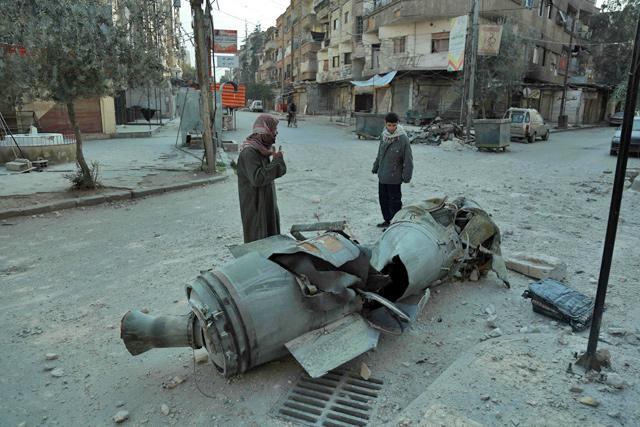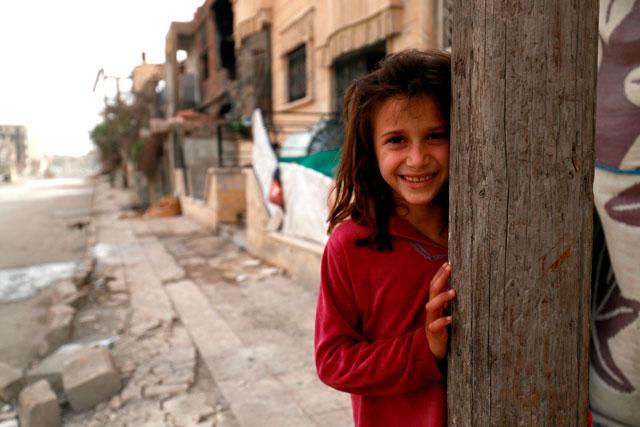You are here
The UN in Syria: years of impotence and failure
By AFP - Feb 24,2018 - Last updated at Feb 24,2018

Syrian men walk past the remains of a rocket in the rebel-held town of Douma, in the besieged Eastern Ghouta region on the outskirts of the capital Damascus, following air strikes by regime forces on the area on Friday (AFP photo)
UNITED NATIONS, United States — Since the start of the conflict in Syria in 2011, the United Nations has expressed outrage and indignation, but has been powerless to stop the carnage.
The latest attempt to secure agreement on a 30-day humanitarian ceasefire, has once more run into Russian resistance with a Security Council vote planned for Friday pushed back to allow more time for negotiations.
Numerous vetoes
In April 2011, six weeks after the start of a protest movement in Syria, veto-wielding powers Russia and China blocked a UN declaration proposed by Western countries condemning repression by the Syrian regime.
On October 4, Russia and China together vetoed a draft resolution by Western countries threatening “targeted measures”.
In all, Moscow has used its veto 11 times to block resolutions in order to protect its Syrian ally from Western pressure.
Two mediators give up
In August 2012, Kofi Annan resigned as UN and Arab League mediator after five months of fruitless efforts, complaining of the lack of great power support for his mission.
He said the increasing militarisation on the ground and the clear lack of unity on the Security Council “fundamentally changed the circumstances for the effective exercise” of his role as mediator.
Annan had proposed a six-point plan calling for a cessation of combat and a political transition. But the plan was never put into effect.
Former Algerian foreign minister Lakhdar Brahimi then took up the baton. In early 2014, he organised in Geneva the first direct negotiations between the government and the opposition, under the auspices of the United States and Russia. But the talks achieved nothing concrete. Brahimi stepped down as mediator after two years of unsuccessful diplomacy.
Nine rounds at the UN
In early 2016, three rounds of indirect negotiations between the regime and opposition groups are held in Geneva, under the supervision of a third UN envoy, Staffan de Mistura. They hit an impasse over the modalities of a political transition and in the face of ceasefire violations.
On December 14, 2017, at the end of a new cycle of negotiations, de Mistura accuses Damascus of causing the collapse of the talks by refusing to dialogue with the opposition. He called it a “big missed opportunity”.
On January 26, a ninth UN cycle of peace talks are held without success in Vienna, where negotiations had moved for logistical reasons.
‘Too little, too late’
In October 2016, de Mistura warned that the rebel stronghold in Aleppo would be completely razed by Christmas if the United Nations failed to stop the carnage.
“Aleppo is now a synonym for hell,” then UN secretary general Ban Ki-moon said at his last press conference on December 16, 2016.
But the United Nations watched helplessly as the Syrian army besieged rebel-held areas of Aleppo, supported by Russia and Iran. A handful of observers arrived to monitor the evacuation of civilians at the end of December. “Too little, too late,” a diplomat said.
Eastern Ghouta
On February 9, Sweden and Kuwait proposed a new draft resolution calling for a 30-day ceasefire and the lifting of sieges imposed by the belligerents, notably the regime, in several Syrian locales.
But the negotiations have bogged down, while an intense air offensive on Eastern Ghouta on the edge of Damascus, where some 400,000 people have been living under siege since 2013, claimed more than 400 lives in five days.
A planned vote at the Security Council was repeatedly delayed on Friday — and eventually pushed back by a day in a bid to avoid a Russian veto.
Related Articles
United Nations Secretary General Ban Ki-moon on Thursday appointed veteran UN official Staffan de Mistura, a former UN special envoy to Afghanistan and Iraq, to replace Lakhdar Brahimi as the international mediator seeking an end to Syria’s civil war.
BEIRUT — Staffan de Mistura announced on Wednesday he will resign as UN envoy to Syria, becoming the third person to quit the post after yea
BEIRUT/UNITED NATIONS — Rescuers in Syria’s eastern Ghouta said the bombing would not let up long enough for them to count the bodies during

















